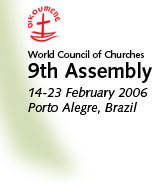 |
WCC > Home > News & media > News | ||||
| About the assembly | Programme | Theme & issues | News & media | |||||
 |
|
||||
|
22.02.05
WCC anticipates post-assembly "confidence and engagement"
Free photos available, see below
Church representatives have outlined an extensive reshaping and streamlining of the activity of the World Council of Churches (WCC), to better equip the global Christian body for a "fast-changing" world context and new patterns of church life.
The WCC's central committee urged the Council "to do less and to do it well" in order "to develop greater clarity and coherence in its unique role as a global fellowship of churches."
The committee also considered new ways of relating to Catholic and Pentecostal churches, other ecumenical organizations and agencies, in order to strengthen collaboration and effectiveness.
The proposals came as the body completed its work on 22 February, and followed an evaluation of its programmatic activity prepared in advance of the WCC's ninth assembly in 2006.
<span style="font-weight: bold; "» Institutional and spiritual renewal
Earlier in the week, the WCC general secretary Rev. Dr Samuel Kobia invited churches to "move with confidence towards a redefined ecumenical engagement concomitant with the challenges and opportunities facing the church at the beginning of the 21st century."
Optimism was expressed when the committee heard that improved management had stabilized the Council's financial situation, and a 2005 budget of almost 39 million Swiss francs was approved, although an underlying annual income drop of around 5% will need to be addressed.
Alongside institutional renewal, Kobia also expressed his conviction "that spirituality will occupy an even bigger place" in the future of ecumenism.
<span style="font-weight: bold; "» Confronting violence and injustice
The overall theme of the meeting was "healing and reconciliation" and the church body responded to situations of conflict and injustice worldwide.
Responses included a statement calling for a termination of the US-led military presence in Iraq and one on the "unconscionable and illegal detention" of prisoners without trial by the US government in Guantanamo Bay. The committee also approved recommendations regarding the situation of migrants and the commemoration of the 90th anniversary of the Armenian genocide on April 24, 2005.
Next year, the WCC will mark the mid-term of its Decade to Overcome Violence (DOV), and the Council's governing body decided that the annual focus will be on Latin America in 2006, and on Europe in 2007. This year the DOV focus is on Asia.
<span style="font-weight: bold; "» Strengthened participation through consensus
As part of an underlying shift of culture, the 158-member body also adjusted its rules and adopted consensus decision-making procedures. The move promises to strengthen the participation and commitment of member churches, particularly Orthodox churches, which have felt alienated by earlier parliamentary-style procedures.
The new methodology was first applied during an open "ecumenical conversation" on the sensitive and, at times, controversial issue of human sexuality during which church representatives reported on how WCC has sought to offer a "space" in which churches with widely-differing views could share experience and build trust.
<span style="font-weight: bold; "» 350 member churches by 2006
In other actions, the committee received eight new member churches into the fellowship, bringing the total WCC membership to 347. Pending applications mean that the Council's total membership is expected to climb to 350 churches in 2006, with a combined membership of more than 550 million people.
<span style="font-weight: bold; "» Welcome to Brazil!
The final meeting of the top WCC governing body came exactly a year in advance of WCC's ninth assembly in Brazil in 2006. The committee approved plans to give a central place to youth at an assembly which, in the words of Kobia, will signal "a new phase in ecumenism."
Free high resolution photos, full information, reports and documents in five languages available at: www.oikoumene.org > Central Committee
|
|||
|
|
|

